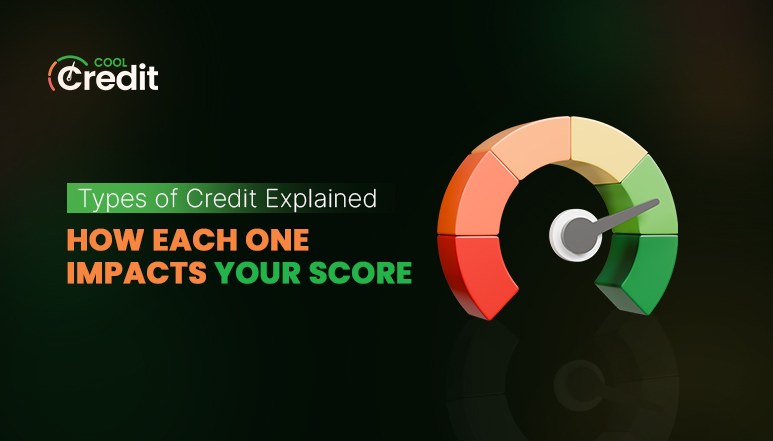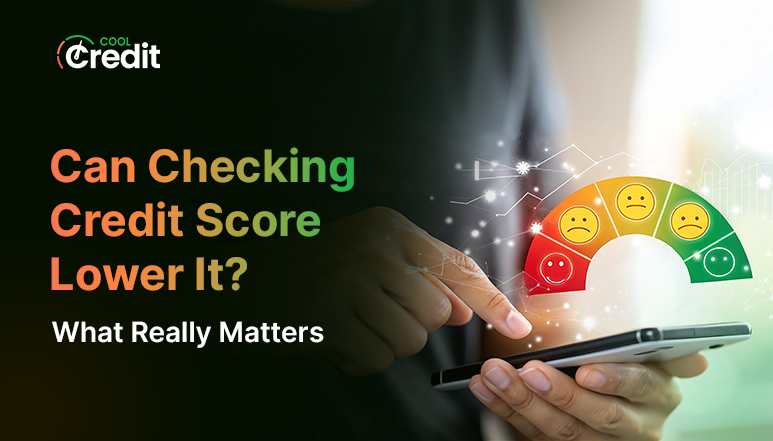
Types of Credit Explained: How Each One Impacts Your Score
There are different ways to borrow money. Each one shapes your credit story in its own way. When you understand the types of credit, you see more than just names or terms. You see how they work, how they impact your score, and how they fit into your life. Some give you flexibility. Others bring structure.
But all of them matter when it comes to building strong credit. This blog walks you through the basics. It explains how each type works and what it means for your credit health. Because managing credit is not about borrowing more. It’s about making smart choices and staying in control.
Fix Your Credit, Reclaim Your Future
Get Started NowDifferent Types of Credit
You will come across three different types of credit. Let’s see how they work for you.
What Is Revolving Credit?
Revolving credit gives you a set or fixed limit that you can use anytime. You don’t have to borrow the full amount—you can take what you need. And once you repay, you can borrow again without reapplying. It’s an ongoing cycle that stays open as long as your account is active.
But to keep it that way, you must make at least the minimum payment. Doing this also helps you avoid late fees or account issues. If you keep up with payments, your limit might increase over time.
Common Types of Revolving Credit
- Credit Cards
They’re the most common form of revolving credit. You can swipe now and pay later, either in full or in parts. But if you carry a balance, you’ll likely pay interest on it.
- Home Equity Line of Credit (HELOC)
This type lets you borrow against the value of your home. It works like a credit card, but your house is used as security.
- Personal Line of Credit (PLOC)
It works just like a HELOC but doesn’t need any property as backup. You borrow during the draw period and repay as you go.
Why It Matters
Revolving credit is flexible. It’s useful for big purchases, emergencies, or unexpected costs. But if you borrow too much or miss payments, it can hurt your score. So try to keep your balance low and pay more than the minimum.
What Is Open-End Credit?
Open-end credit lets you borrow money, pay it back, and borrow again. It doesn’t come with an end date, so you can keep using it.
That’s why it’s often called revolving credit. It resets after each payment. You only pay interest on the amount you borrow, not your total limit. And in some cases, there’s no interest at all if you repay on time. Some accounts don’t even have a fixed credit limit.
How It Works
- You borrow money when required.
- You repay it by the end of your billing cycle.
- Once paid, that amount becomes available to use again.
- It’s simple, but only works well if you stay consistent with payments.
- Late or missed payments can certainly affect your credit and add extra charges. So, it’s best to borrow what you can afford to pay back.
Examples You Should Know
▪ Charge cards are a good example. They work like credit cards but with rules. The key difference? You must pay the full balance every month. No carrying over means no unpaid debt, but also no skipping payments.
▪ Some collection accounts may also be treated as open-end credit by lenders. But they come with different terms and can affect your credit score.
Why It Matters
Open-end credit can help you build credit if used responsibly. It gives you flexibility but needs discipline. You should track your spending, stay within limits, and pay on time. That’s how you avoid interest and keep your credit score healthy.
What Is Installment Credit?
Installment credit is a loan you repay in parts. Usually month by month. You borrow a fixed amount and pay it back over a set period. Each payment includes part of your loan and a bit of interest. Unlike credit cards, you can’t reuse the credit once it’s paid off. It’s closed-end credit, which means it has a clear start and finish.
You get the full amount upfront, and then the countdown begins. The amount stays fixed, and so do your monthly payments in most cases. Some loans need collateral. It could be a house, a car, or even your college education.
Types of Installment Credit
- Mortgages
Mortgages help you buy a home and pay it off slowly over time. You usually get 15 to 30 years to repay the loan. Since your home is used as collateral, interest rates are often lower.
- Personal Loans
These are simple. You apply, get a lump sum, and repay monthly. No collateral in most cases. Just a promise to pay it back on time. It can cover anything from emergency medical bills to unexpected expenses.
- Auto Loans
Auto loans work the same way. Fixed payments over a few years. Most terms fall between 2 to 7 years, depending on the car and lender. Miss payments, and the lender may take the car back.
- Student Loans
These cover college fees, books, housing, and more. You start repaying after school ends. Some loans are from the government. Others are from private lenders.
A Few Things to Remember
Installment credit gives you structure. It breaks big costs into small steps. But that also means you must stay on track with every due date. Missing a payment could hurt your credit or add extra charges. So before signing, check the total cost, interest, and the fine print. And if you ever have extra cash, paying early can save on interest.
Bad Credit? Not for Long
Start Repairing TodayWhat Each Credit Type Really Means for Your Score
Not all credit works the same way. Let’s see what revolving, installment, and open-ended credit do to your overall score.
| Factor | Revolving Credit | Installment Credit | Open-End Credit |
| Affects usage ratio? | Yes – keep balances low to help your score | No – loan amounts don’t count toward usage | No – not included in usage ratio |
| Helps your score by | Showing on-time payments, low balances, and credit variety | Building strong payment history and credit mix | Showing consistent payments and adding variety |
| Best way to use it | Don’t max out your card and pay more than the minimum | Always pay on time and avoid missing payments | Pay the full balance each month if possible |
| Good for credit mix? | Yes – shows you can manage flexible credit | Yes – shows you can handle fixed payments | Yes – adds another type of account to your mix |
How Types of Credit Affects Your Credit Score
You may know there are two main types of credit: installment and revolving. Both types affect your credit score, but they do so in different ways.
▪ Your Payment History Matters the Most
No matter which credit type you have, paying on time is important. Your payment history makes up the biggest and most crucial part of your credit score – 35%. If you miss payments, your score drops and lenders may see risk. But if you pay on time, your score will slowly get stronger.
▪ Revolving Credit Affects Your Usage Ratio
Credit cards give you flexibility, but they can also harm your score. The current amount you owe compared to your credit limit is called utilization ratio. A high ratio tells lenders you may be struggling to manage your debt. You can avoid this by keeping balances low and paying more than minimum.
▪ The Length of Your Credit History Also Counts
Lenders want to see and confirm that you can manage credit for a long time. The longer you’ve had credit accounts open, the better it looks for you. Even your first credit card can work in your favor if paid responsibly. So, avoid closing older accounts unless there’s a strong reason to do so.
▪ A Mix of Credit Types Can Help
Having different credit types shows lenders you can handle money in different ways. A healthy credit mix includes both revolving accounts and fixed installment loan payments. If you rely only on one type, you may miss out on points. But don’t take unnecessary loans just to improve your credit mix score.
▪ Be Careful When Applying for New Credit
Applying for many credit accounts at once may hurt your score quickly. Lenders might think you are taking on too much debt too soon. It’s better to apply only when needed and avoid multiple applications at once.
| Valuable Tip: Check your credit report regularly to spot errors that may lower your score. Always pay bills on time and use only a small part of credit. Small responsible actions, done consistently, can improve your credit score over time. |
Handle Your Credit with CoolCredit
There are different types of credit—like credit cards, loans, or credit lines. Each one works differently, but all of them affect your credit score. That’s why it’s important to manage them the right way.
CoolCredit helps you do that by showing what’s helping or hurting your score. It monitors your credit report and highlights anything that needs your attention. If there are errors or negative remarks, you can fix them right away. The app gives you ready-to-use dispute letters so you don’t start from scratch. This makes it easier to correct mistakes without feeling lost in the process.
But fixing errors is just one part. CoolCredit also helps you plan ahead. It gives you simple, personalized strategies to improve your credit over time. And if things feel confusing, then CoolCredit provides Expert Assist. You can talk to credit experts who guide you through tougher situations.
With time, your score can start to move in the right direction. You fix what’s wrong, stay on track, and build stronger credit habits.
Conclusion
Credit works best when you understand how to use it. Each type serves a purpose and affects your score in different ways. CoolCredit helps you manage them with ease. It shows what’s helping, what’s hurting, and what to fix. From tracking your report to building strong credit, it’s all in one place.
FAQs
Q: Can I Have Multiple Types of Credit at the Same Time?
A: Yes, using credit cards, loans, and lines together improves your credit mix. Managing different types of credit shows lenders you’re financially responsible and consistent.
Q: How Do I Know Which Types of Credit are Right for Me?
A: Revolving credit gives flexibility, while installment credit helps with big one-time purchases. Open-end credit works well if you repay the full balance each cycle.
Q: Will Using Different Types of Credit Help Improve My Credit Score?
A: Yes, mixing credit types builds a stronger score by showing repayment ability. Just manage them responsibly—don’t overspend, and always pay on time.
Q: Is it Okay if I Only Have Revolving Credit Like a Credit Card?
A: Only having revolving credit is fine, but it limits your credit mix benefits. Adding installment credit strengthens your profile and balances your credit history.
Q: What Happens if I Carry a Balance on My Credit Card Every Month?
A: Carrying a balance increases your utilization, which can lower your credit score. It’s better to pay more than the minimum or in full when possible.
Q: Should I Close Old Accounts if I No Longer Use Them?
A: No, older accounts help boost credit history and increase your average account age. Unless they cost you money, keeping them open usually benefits your score.
Explore Similar Blogs
1. What Is Credit? Breaking Down the Basics







